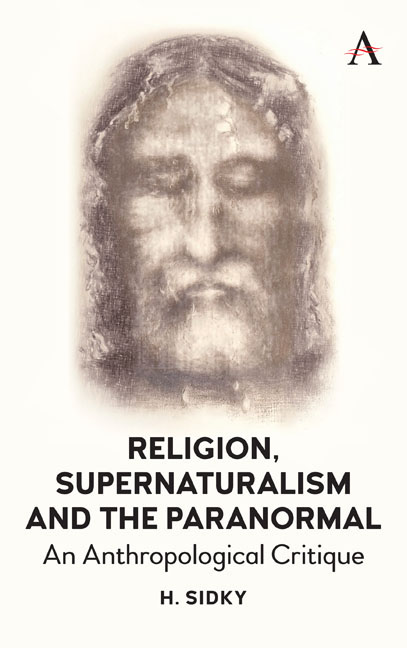Book contents
- Frontmatter
- Dedication
- Contents
- Acknowledgments
- Introduction
- Chapter One The Problem with Religion: Preliminary Issues
- Chapter Two The Unreal Real: The Supernatural, Religion, and the Paranormal
- Chapter Three Can Science Say Anything About Religion and the Supernatural?
- Chapter Four Ghostly Rappings, the Science of the Soul, and the Religious Nature of the Paranormal
- Chapter Five Ghostly Encounters in the Field: Anthropology of the Paranormal or Paranormal Anthropology?
- Chapter Six Why We Think the World Is Haunted
- Chapter Seven Cognitive Biases and Why People Think Eerie Thoughts
- Chapter Eight Miracles as Evidence of God's Actions in the World
- Chapter Nine When God Talks to People: Are Religious Experience Evidence of God?
- Chapter Ten Books Authored by God? Sacred Texts as Evidence of the Supernatural
- Chapter Eleven God's Fingerprints in the Natural World: Intelligent Design, Irreducible Complexity, and Cosmic Fine-Tuning
- Chapter Twelve The Miracles of the Bible: The Quintessential Foundations of Paranormal Beliefs in Western Culture
- Chapter Thirteen Jesus the Miracle Worker, Magician, and Sorcerer
- Chapter Fourteen Jesus's Empty Tomb, Missing Body, and Return from The Dead: Sources for the Paranormal Tale
- Chapter Fifteen The Post-Resurrection Appearances in the New Testament
- Chapter Sixteen Coping with Failed Prophesy: A Socio-Psychological Explanation for the Rise of Christianity
- Chapter Seventeen Conclusions: Why Religious and Paranormal Beliefs Persist and Their Dangers
- References
- Index
Chapter Twelve - The Miracles of the Bible: The Quintessential Foundations of Paranormal Beliefs in Western Culture
Published online by Cambridge University Press: 16 December 2019
- Frontmatter
- Dedication
- Contents
- Acknowledgments
- Introduction
- Chapter One The Problem with Religion: Preliminary Issues
- Chapter Two The Unreal Real: The Supernatural, Religion, and the Paranormal
- Chapter Three Can Science Say Anything About Religion and the Supernatural?
- Chapter Four Ghostly Rappings, the Science of the Soul, and the Religious Nature of the Paranormal
- Chapter Five Ghostly Encounters in the Field: Anthropology of the Paranormal or Paranormal Anthropology?
- Chapter Six Why We Think the World Is Haunted
- Chapter Seven Cognitive Biases and Why People Think Eerie Thoughts
- Chapter Eight Miracles as Evidence of God's Actions in the World
- Chapter Nine When God Talks to People: Are Religious Experience Evidence of God?
- Chapter Ten Books Authored by God? Sacred Texts as Evidence of the Supernatural
- Chapter Eleven God's Fingerprints in the Natural World: Intelligent Design, Irreducible Complexity, and Cosmic Fine-Tuning
- Chapter Twelve The Miracles of the Bible: The Quintessential Foundations of Paranormal Beliefs in Western Culture
- Chapter Thirteen Jesus the Miracle Worker, Magician, and Sorcerer
- Chapter Fourteen Jesus's Empty Tomb, Missing Body, and Return from The Dead: Sources for the Paranormal Tale
- Chapter Fifteen The Post-Resurrection Appearances in the New Testament
- Chapter Sixteen Coping with Failed Prophesy: A Socio-Psychological Explanation for the Rise of Christianity
- Chapter Seventeen Conclusions: Why Religious and Paranormal Beliefs Persist and Their Dangers
- References
- Index
Summary
The writers of the New Testament cannot be regarded as trustworthy witnesses to the resurrection— first because they were not eye-witnesses; second, because they were the slaves of a bewildering Old Testament exegesis and numberless current superstitions; and third, because they had little or no conception of any distinction between objective fact and subjective impression.
— Charles Gorham, The First Easter Dawn (1908)We entertain a suspicion concerning any matter of fact, when the witnesses contradict each other; when they are but few, or of a doubtful character; when they have an interest in what they affirm. […] There are many other particulars of the same kind, which may diminish or destroy the force of any argument, derived from human testimony.
— David Hume, Enquiries Concerning the Human Understanding (1748)What we remember about an incident can actually be changed after the fact. When this happens, the witness truthfully testifies to remembering something that never happened.
Terence Hines, Pseudoscience and the Paranormal (2003)The crux of the religionist assault on science and anthropology is the assertion that their supernatural and paranormal view of the world and universe based upon a Christian “evidence base” and “positive theistic arguments” provides a superior explanatory framework. In doing so, as noted before, religionists have made their theistic premises a legitimate subject for scientific and anthropological scrutiny in the tradition of systematic skepticism. In this chapter, therefore, I focus on the core premises of this “evidence base” and attempt to find out how well they hold up under such scrutiny and whether or not the religionist claim about the superiority of their supernatural framework, or what the theistic philosopher Plantinga calls an “Augustinian Science,” has any evidentiary justification. The approach is the same one I use when evaluating similar types of evidence in the context of any other anthropological analyses of supernatural and paranormal claims. This entails an examination of historical records, textual analysis in relation to anthropological findings, use of the principles of evolutionary and cognitive psychology, prior probabilities, the presence or absence of disconfirming evidence, and the availability of non-supernatural explanations that accord with the empirical evidence.
- Type
- Chapter
- Information
- Religion, Supernaturalism, the Paranormal and PseudoscienceAn Anthropological Critique, pp. 295 - 312Publisher: Anthem PressPrint publication year: 2019



